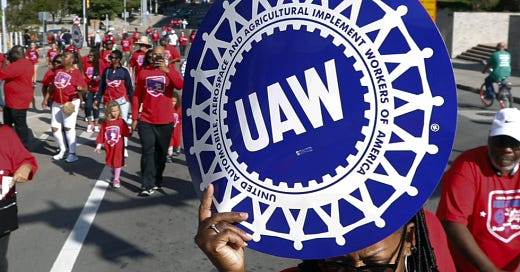The new leadership of the United Auto Workers is demanding that the Big Three automakers give its members a 40 percent raise over the four years of its next contract. The demand stems from the 40 percent increase in compensation raked in by the corporations’ CEOs over the past four years.
Only fair, right?
When I graduated from college, the pay ratio of CEOs to the typical worker was 20-to-1. In 1992, when I urged candidate Bill Clinton to propose that corporations shouldn’t be able to deduct CEO pay exceeding $1 million from their taxable earnings, the ratio was 100-to-1.
After being elected, Clinton — at the behest of economic adviser Robert Rubin, former CEO of Goldman Sachs — allowed corporations to deduct CEO pay of any amount as long as the pay was tied to stock performance.
From then on, CEOs were compensated with lavish stock options and grants. They used corporate profits to buy back shares of stock, and the stock market took off.
That blew the lid off their compensation packages. Now the ratio of CEO pay to that of the typical worker is way over 300-to-1.
Even if the Big Three agree to the UAW’s demand, it wouldn’t shrink the mammoth pay packages going to their CEOs. It would only limit the percentage growth of CEO compensation to the same percentage growth of their workers’ pay. Since both groups are starting from such radically different bases, it wouldn’t even reduce the widening pay gap between them.
But it would at least bring renewed attention to the shameless scandal of CEO pay.
Most Americans already think CEOs are overpaid but believe they’re making only a fraction of what they’re actually raking in. According to a 2016 survey by the Stanford Business School, Americans think CEOs are pulling in roughly a tenth of what they’re actually making, and that the right ratio between CEO and median worker pay should be 6-to-1. (Again, it’s more than 300-to-1.)
The UAW’s efforts could thereby rekindle a debate over the astounding inequalities of this second Gilded Age, when billionaires inhabit 25-bedroom mansions while legions of homeless camp under freeways and most young workers can’t afford a down payment on a house.
Anyone for a wealth tax?



We have a wealth tax! It is called property tax on real estate and almost all states use it.
Often the excuse I read in the financial press is that implementing a wealth tax on securities and other financial instruments would be "too difficult." Really? How do we do it then for real estate?
And how has a country like Switzerland done it for decades? https://taxsummaries.pwc.com/switzerland/individual/other-taxes#:~:text=All%20cantons%20levy%20a%20net,shares%2C%20funds%20and%20other%20equities.
Yes, it's time for a wealth tax with some carve outs for the middle class!
Every time these executives are interviewed, the politicians stop just short of the big question: if, as they claim, it is simply impossible for them to share their massive wealth...to give predictable hours....to pay a wage such that employees no longer have to depend on government support....then does it not follow that their "success" and wealth and entire business model actually DEPENDS on the exploitation of workers?